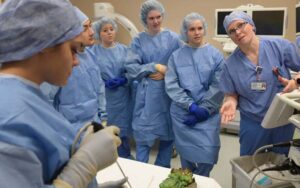
This nation has been experiencing a skills gap for a number of years. There is a great need for people to fill positions in such high-demand areas as health care, advanced manufacturing and construction, says Dr. Todd Bonsall, superintendent of the Hunterdon County Vocational School District.
Read this op-ed as it originally appeared on nj.com
By Todd Bonsall
Each generation strives to make its mark. As an educator, I am especially encouraged by the passion and determination of today’s youth to be part of something greater than themselves. This drive was magnified as the pandemic unfolded over the spring semester. Our students at Hunterdon County Vocational School District (HCVSD) not only impressed me through efforts to collect PPE and to make “thank you” bags for frontline workers but through conversations with staff and each other about leveraging their education to make a more sustainable, lasting impact on our nation and beyond. This should encourage all of us about the future.
These bright, motivated young people seek educational experiences that enable them to connect with similarly minded peers while offering opportunities to make a difference through research, health care, education, public service and more. They are looking for pathways to bring about great change and the right peer group to work alongside as they set out to achieve their ambitious goals. And, they are starting this search earlier and earlier in their educational journeys.
Career and Technical Education (CTE) in New Jersey has kept pace with the demand for specialized training, curriculum and extracurricular opportunities in increasingly diverse fields for high school students. Misconceptions about CTE still exist. In reality, CTE is for any student who is ready to get a jumpstart on his or her future, be it developing the next sought-after vaccine, fighting climate change, getting vehicles back on the road safely or taking care of our four-legged friends.
CTE prepares knowledgeable, skilled workers by integrating academics and real-world, hands-on experiences. Importantly, CTE learning focuses on student outcomes, often leading to greater engagement, better performance and a deeper understanding of the link between education and career goals. Not surprisingly, more than 75% of CTE graduates pursue higher education or additional technical training.
From another perspective, this nation has been experiencing a skills gap for a number of years. There is a great need for people to fill positions in such high-demand areas as health care, advanced manufacturing and construction. Additionally, the pandemic gave greater visibility and significance to “frontline” workers such as doctors, nurses, EMTs, nurses’ aides, phlebotomists and more, demonstrating the importance of filling these positions with highly-skilled, competent individuals.
HCVSD is prepared to help fill these gaps and train the next generation on the front lines. We offer a range of programming from our rigorous four-year Biomedical Sciences Academy to our Polytech Career & Technical High School programs in Allied Health, Clinical Health Services, EMT Academy, Fire Academy, Health Care Science and Pre-Nursing. We also offer options for nontraditional students inspired to make a difference in public health through our Adult & Continuing Education division.
Health care professions are an obvious choice for students looking to make a difference. Yet, the pandemic also highlighted the ever-growing need for high-tech minds to keep business, education, and commerce – essentially, everyday life – moving forward. Auto technicians, law enforcement and, in some cases, construction and heavy equipment operators, also have remained in demand and offer even greater post-pandemic employment opportunities.
CTE is the answer to ensuring pipelines to these professions remain full. Specifically, at HCVSD, we offer the four-year Computer Science & Applied Engineering Academy and Polytech’s Computer Networking & Cybersecurity, Law & Homeland Security, Automotive Services, Autobody Collision Repair, and Automotive Technology, as well as Construction Science and Heavy Equipment Operator programs. All provide opportunities for students to grow into essential roles that help us continue to retain some sense of normalcy and security despite what’s going on around us.
Over the past months, many students have grown increasingly eager to use their skills in ways to help us through many of the challenges we face. The pandemic is the example in focus today, but climate change, mental health awareness, and equity are among topics our students address through their coursework, career-focused clubs and extracurricular activities.
I look forward to the school year ahead with an even greater understanding of the role education – especially CTE – plays in helping our youth discover the path they’ll start on today to make a difference tomorrow.
Dr. Todd Bonsall is the superintendent of the Hunterdon County Vocational School District.



